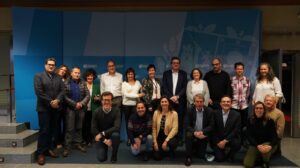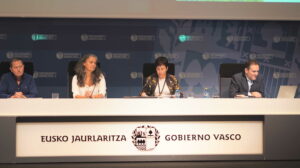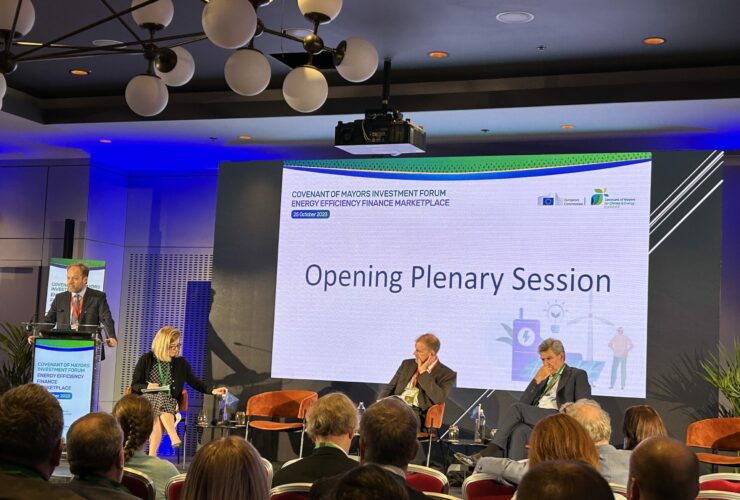- Agree project holds its “Final Conference” proposing an innovative vision for energy renovation
- The AGREE project comes to an end after four years of work on energy renovation in the Basque Country, fulfilling its investment and CO2 reduction targets
- The consortium, led by the Housing Department of the Basque Government, has launched three innovative pilots in Basauri, Donostia/San Sebastian and Vitoria-Gasteiz.
Vitoria, 21 de noviembre de 2023
After fulfilling its objectives, the consortium of entities that make up HORIZON Agree has brought the project, which has had to grapple with massive global hurdles since 2019, to a close. The resilience of the human teams has made it possible to successfully conclude the project, which will continue to add value by applying the learnings detailed today.
The Final Conference of this project started with a presentation by the project coordinator Carlos López Losada, who gave way to Mr. Mario Yoldi, Director of Planning and Operational Processes of the Vice-Ministry of Housing of the Basque Government, who highlighted the importance of the methodologies used in this European project and their value in decision-making and prioritising policies.
Yoldi expressed his commitment to collaborating with urban renovation companies (URCs), which have made it possible to achieve remarkable efficiency in terms of management, and pointed out that the responsible use of data and artificial intelligence is a growing trend to which the department is devoting considerable effort.
Patricia Molina Costa, Director of City, Territory and the Environment at Tecnalia’s technological research and development centre, then reviewed the keys to the project, stressing the need to carry out a good assessment and provide financial support for renovation. Molina detailed the methodology for identifying the buildings to be targeted, prioritising the areas of intervention and carrying out a detailed analysis on each entry point, a solid demand aggregation system, which is a strength when it comes to replicating the project.
Molina praised the work of the URCs at the forefront of the project and looked at aspects of the impacts achieved over and above the targets, such as investments in sustainable renovation, energy and emissions savings, and improvements by two or three letters in the energy rating of many buildings.
Meanwhile, Aitor Sáez de Cortazar, Project Manager of the Circular Economy Department of the public company Ihobe, pointed out the need to incorporate key instruments from Europe into the established system, such as environmental taxonomy and developments in the circularity of materials in the next regulations on construction products and the future directive on energy efficiency.

Saéz de Cortazar outlined the tools used to multiply impact and support replication, and their performance, and ended his presentation with a few ideas on how to improve future developments. He pointed to the introduction of validations of environmental sustainability in refurbishment projects, and new strategies such as servitisation to overcome financial difficulties for refurbishments.
After the question and answer session, it was the turn of Andoni Hidalgo from OPENGELA to present this “sister project” with its goal of urban regeneration and commitment to the “one stop shop” offices that support citizens in the neighbourhoods of Otxarkoaga in Bilbao and Txonta in Eibar.
To round things off, the urban renovation companies, the guiding hands behind the project in the words of Carlos López Losada, shared their experience of carrying out the project, with presentations by Miren Cortazar, from Ensanche 21, Pedro Rodriguez Toyos from Bidebi and Maider Romay from Donostiako Etxegintza.

As representatives of the SURs, they underlined the difference of going out to meet the residents, and the vital role played by investments.
The review of the project also included the difficulties, with particular emphasis on the pandemic and the war in Ukraine, which in 2019 forced all of the entities involved in the project to be resilient and innovative.
The project and its results
Over the past four years, HORIZON Agree has developed and deployed innovative mechanisms for demand activation and aggregation, improved governance, and tailor-made funding solutions to leverage investments for energy renovation in residential buildings.
The consortium for this project worked closely together, bringing innovation to the modernisation of residential buildings built between 1940 and 1980, with its three pilot projects focusing on energy efficiency, thermal envelopes and improving accessibility by installing lifts.
The impacts of the project have far exceeded the targets set for the various points of interest, with investments of 10.8 million euros compared to the 8.5 million euros planned, 602 homes instead of 510, and 48,000m² compared to the 14,500m² initially planned.
In terms of energy and emissions, primary energy savings have reached 5.92 GWw/year compared to the 2.62 expected, and the reduction in emissions has reached 1,233 TCO²/year compared to the 249 required. 35% of the buildings involved improved their building energy rating by 2 letters and 41% improved their heating demand by 2 letters and 15% by 3 letters.
The project now has a second path thanks to the demand aggregation tools created and their future application in municipalities in the Basque Country and throughout Europe, which are increasingly joining the European renovation wave.
[/vc_column_text][/vc_column][/vc_row]



